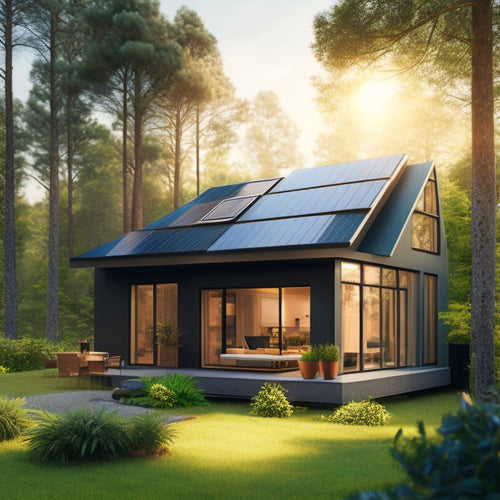
Are Commercial Rooftop Solar Panels Worth the Investment?
Share
You can install commercial rooftop solar panels with confidence, as they consistently deliver considerable energy savings, reduce your reliance on the grid, and provide a strong return on investment. By investing in solar energy, you'll not only minimize your environmental footprint but also protect your business against price volatility and potential outages. With government incentives and tax credits available, the upfront cost can be greatly reduced, making it a more accessible option. As you investigate the benefits and feasibility of commercial rooftop solar panels, you'll reveal the key to accessing a sustainable, cost-effective energy solution for your business, and the benefits will only continue to grow from there.
Key Takeaways
- Commercial rooftop solar panels offer enhanced energy independence, reduced reliance on the grid, and protection against price volatility and outages.
- While upfront installation costs vary, long-term energy savings and government incentives like the Federal Solar Tax Credit can provide a significant return on investment.
- Proper installation, maintenance, and monitoring are critical to maximizing energy production and minimizing investment risks.
- Successful implementations demonstrate substantial energy savings, reduced carbon footprint, and increased property value, aligning with corporate social responsibility goals.
- Careful planning, optimized system design, and real-time performance tracking are essential for reaping the benefits of commercial rooftop solar panels.
Benefits of Commercial Solar Energy
By integrating solar energy into your commercial operations, you can reap a multitude of benefits that extend far beyond environmental stewardship. One significant advantage is enhanced energy independence. By generating your own electricity, you reduce your reliance on the grid, protecting your business from price volatility and potential outages. This autonomy also enables you to better manage your energy costs, ensuring a more predictable and stable bottom line.
Moreover, commercial solar energy installations contribute to grid resilience. By feeding excess energy back into the grid, you help stabilize the electrical infrastructure, supporting the overall reliability of the power supply. This, in turn, benefits the broader community, making your business a significant contributor to the local energy ecosystem.
Additionally, solar energy systems can provide backup power during outages, ensuring business continuity and minimizing downtime. By embracing commercial solar energy, you not only reduce your environmental footprint but also strengthen your operations and contribute to a more resilient energy infrastructure.
Cost of Installation and Maintenance
The upfront investment in commercial rooftop solar panels can be substantial, with costs varying widely depending on factors such as system size, panel efficiency, and installation complexity.
-
System Size: Larger systems require more equipment, increasing the overall cost.
-
Panel Efficiency: High-efficiency panels may be more expensive, but they generate more power per unit area.
-
Installation Complexity: Rooftop obstacles, such as skylights or vents, can add to the installation cost.
You should also consider the installation factors that can affect the cost. For instance, the type of mounting system, electrical infrastructure, and local building codes can all impact the final bill.
Additionally, maintenance costs should be factored into your overall investment. While solar panels require minimal upkeep, you'll still need to budget for occasional cleaning, inspections, and potential repairs.
Understanding these costs will help you make an informed decision about whether commercial rooftop solar panels are right for your business.
Energy Savings and ROI Analysis
As you weigh the upfront investment in commercial rooftop solar panels, you'll want to contemplate the long-term benefits that can offset those costs. One significant advantage is the reduction in energy consumption from the grid. With solar panels, you'll be generating your own clean energy, which translates to lower utility bills. This decrease in energy consumption directly affects your bottom line, allowing you to allocate resources more efficiently.
To better understand the financial implications, conduct an extensive ROI analysis. This involves calculating the payback period, or how long it takes for the system to pay for itself through energy savings.
A thorough financial forecasting model will help you visualize the long-term benefits, including the potential for increased property value and reduced maintenance costs. By analyzing your energy usage patterns and applying them to your ROI analysis, you'll gain a clear understanding of the financial benefits of investing in commercial rooftop solar panels.
This data-driven approach will enable you to make informed decisions about your investment, ensuring it aligns with your business goals and objectives.
Government Incentives and Tax Credits
You'll benefit from government incentives and tax credits when investing in commercial rooftop solar panels.
The Federal Solar Tax Credit, for instance, allows you to claim a credit of 26% of the total project cost against your federal income taxes.
Additionally, you may be eligible for state and local rebates, which can further reduce your upfront investment.
Federal Solar Tax Credit
By investing in commercial rooftop solar panels, business owners can take advantage of the Federal Solar Tax Credit, a government incentive designed to offset the upfront cost of solar installation.
This credit allows you to claim a percentage of the total cost of your solar panel system as a credit against your federal income taxes.
Here are three key benefits to keep in mind:
-
Significant savings: The Federal Solar Tax Credit can cover up to 26% of the total cost of your solar panel system, which can result in significant savings.
-
Tax implications: The credit can be carried forward for up to 20 years, providing a potential long-term benefit for your business.
-
Federal benefits: As a business owner, you can claim the credit against your federal income taxes, reducing your tax liability and increasing your cash flow.
State and Local Rebates
Beyond the Federal Solar Tax Credit, commercial rooftop solar panels can also benefit from state and local rebates, further reducing the upfront cost of installation.
These incentives vary by state and even locality, but they can provide significant savings.
| State/Local Incentive | Description | Benefit |
| California Solar Initiative | Rebate for commercial solar installations | Up to $0.29/Watt |
| New York State Energy Research and Development Authority (NYSERDA) | Incentives for commercial solar installations | Up to $0.40/Watt |
| Massachusetts Clean Energy Center (MassCEC) | Rebate for commercial solar installations | Up to $0.25/Watt |
You can take advantage of these state programs and local incentives to reduce the initial investment in your commercial rooftop solar panels.
For instance, if you're installing a 100 kW solar panel system in California, you could receive a rebate of up to $29,000.
Additionally, some states offer property tax exemptions or sales tax exemptions for solar equipment, which can lead to further cost savings.
Be sure to research the specific state and local incentives available in your area to maximize your savings.
Space and Structural Requirements
Installing commercial rooftop solar panels requires careful consideration of space and structural requirements to guarantee a safe and efficient installation.
You'll need to assess your rooftop's available space, taking into account obstructions like vents, skylights, and HVAC units. Additionally, your roof's orientation and pitch will impact the system's energy production and overall performance.
Here are three key considerations:
-
Load capacity: Confirm your roof can support the weight of the solar panels, mounting system, and any additional components. A structural engineer may be needed to verify your roof's load capacity.
-
Roof orientation: Ideal energy production occurs when solar panels face directly at the sun. However, even with less than ideal orientation, solar panels can still generate significant energy.
-
Structural integrity: Verify that your roof is in good condition, with no signs of wear, damage, or decay. This confirms the solar panel system can be securely attached and won't compromise the roof's integrity over time.
Environmental Impact and Sustainability
As you change to renewable energy sources, you're likely driven by a desire to minimize your carbon footprint and contribute to a more sustainable future.
By installing commercial rooftop solar panels, you'll be reducing your reliance on fossil fuels and mitigating climate change. Renewable resources like solar energy offer a cleaner, more energy-efficient alternative, which aligns with sustainable practices and environmental regulations.
The ecological benefits of solar energy are undeniable. By utilizing green technology, you'll be decreasing air pollution, conserving water, and reducing waste.
Furthermore, solar panels require minimal maintenance, making them an attractive option for businesses seeking to optimize energy efficiency.
As you shift to renewable energy, you'll not only be reducing your carbon footprint but also contributing to a cleaner, healthier environment for future generations.
Case Studies and Success Stories
Numerous businesses have successfully integrated commercial rooftop solar panels into their operations, yielding impressive results. You may be wondering what makes their experiences so successful. Let's take a closer look.
3 Key Takeaways from Successful Implementations:
-
Optimized System Design: A well-designed system guarantees maximum energy production and minimizes installation challenges. For instance, a company in California optimized its system design to generate 1.2 megawatts of power, reducing its energy costs by 50%.
-
Proper Installation and Maintenance: Professional installation and regular maintenance are essential to guarantee the system operates at its full potential. A manufacturing facility in New York invested in regular maintenance, resulting in a 25% increase in energy production.
-
Monitoring and Performance Tracking: Real-time monitoring and performance tracking help identify areas for improvement and optimize energy production. A retail store in Texas implemented a monitoring system, which helped them reduce their energy consumption by 30%.
These case studies demonstrate that with careful planning, installation, and maintenance, commercial rooftop solar panels can be an important investment for your business.
Frequently Asked Questions
Can Commercial Solar Panels Be Installed on Old or Historic Buildings?
You'll need to maneuver through historic building regulations, ensuring solar panels blend with the original design. Aesthetics matter, so you'll want to choose panels that complement the building's character, balancing energy efficiency with preservation of its historic charm.
Do Solar Panels Void the Roof's Warranty or Affect Its Integrity?
As you consider utilizing the sun's energy, a nagging question arises: do solar panels void your roof's warranty or compromise its integrity? Rest easy, modern solar installation requirements guarantee a watertight seal, and most manufacturers provide clear roof warranty implications, giving you peace of mind.
How Do I Monitor and Track My Commercial Solar Panel's Performance?
You'll want to track your commercial solar panel's performance using monitoring tools that provide key performance metrics, such as energy output, temperature, and irradiance, to guarantee peak operation and identify potential issues before they impact your bottom line.
Can I Sell Excess Energy Generated Back to the Grid?
You can sell excess energy back to the grid through net metering, earning energy credits that offset your utility bills; this way, you'll maximize your commercial solar panel's potential and reap financial benefits from your investment.
Are Commercial Solar Panels Resistant to Extreme Weather Conditions?
You'll find that commercial solar panels are built to withstand extreme weather conditions, featuring sturdy designs and materials that guarantee durability and reliability, so you can trust their performance even in harsh climates.
Conclusion
You've weighed the pros and cons, and the verdict is clear: commercial rooftop solar panels are worth the investment. With benefits like reduced energy costs, increased property value, and a smaller carbon footprint, the advantages far outweigh the costs. Plus, with government incentives and tax credits, the financial burden is considerably reduced. So, go ahead and utilize the power of the sun - your business, and the planet, will thank you.
Related Posts
-

Top 10 Tips for Buying Car Accessories Online
When purchasing car accessories online, you should take proactive steps to avoid low-quality or incompatible products...
-

3 Best State and Local Solar Incentives USA
You can greatly reduce your energy dependence and save thousands of dollars by taking advantage of the top state and ...
-

Reduce Solar Panel Cost for Your Small Home
By evaluating your energy needs, choosing the right installer, and selecting cost-effective solar panel options, you ...


